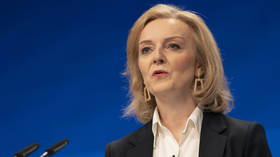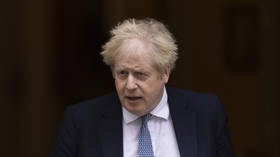UK reveals conditions for lifting Russia sanctions

The UK could lift its “crippling” sanctions should Russia withdraw from Ukraine and commit to abstaining from “further aggression,” Britain’s foreign secretary, Liz Truss, has revealed.
In an interview with the Sunday Telegraph, Truss said they “should only come off with a full ceasefire and withdrawal, but also commitments that there will be no further aggression.” She described the sanctions as the “hard lever” that should be used when dealing with Russia – which she claimed had not complied with the “multiple agreements” it had signed up to.
Truss maintained that the lifting of sanctions should be seen as the incentive in exchange for which Russian President Vladimir Putin would be required to stop his military campaign in Ukraine. However, should there be “further aggression in future” on the part of Moscow, there would have to be an option on the table to impose “snapback sanctions,” she noted.
Truss revealed that she had established a special “negotiations unit” in the Foreign Office, tasked with aiding future peace talks.
She is the first British official to suggest that the sweeping sanctions levied on Russia could be removed as part of a settlement between Moscow and Kiev.
Her remarks echo those of US Secretary of State Antony Blinken, who, in a statement last Wednesday, pointed out that “sanctions in and of themselves are not designed to be permanent.” Blinken noted similarly that if “Putin stops the aggression,” the punitive economic measures could “go away.”
A source close to Truss is cited by the Sunday Telegraph as having said that, as “Russia has shown it simply does not abide by international rules and treaties,” the prospect of sanctions being snapped back “would be a significant deterrent to future aggression or rule-breaking.”
Since February 24, when Russian troops and military hardware crossed the Ukrainian border, the US, the EU, the UK, and several other nations have imposed on Moscow several rounds of unprecedented economic sanctions, targeting, among other entities and individuals, its central bank’s assets, a number of its commercial banks, a host of businesspeople, and the Russian leadership directly.
In response, Russia has demanded that any nation buying its oil and gas that has imposed sanctions pay in rubles for importing hydrocarbons.
Moscow sent its military into Ukraine a month ago, following a seven-year standoff over Kiev’s failure to implement the terms of the Minsk agreements, and Russia’s eventual recognition of the Donbass republics of Donetsk and Lugansk. German- and French-brokered protocols had been designed to regularize the status of those regions within the Ukrainian state.
Russia has now demanded that Ukraine officially declare itself a neutral country that will never join the US-led NATO military bloc. Kiev insists the Russian offensive was completely unprovoked and has denied claims it had been planning to retake the two republics by force.













